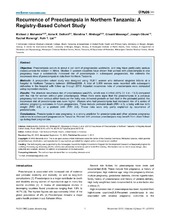Recurrence of Preeclampsia in Northern Tanzania: A Registry-Based Cohort Study
Mahande, Michael Johnson; Daltveit, Anne Kjersti; Mmbaga, Blandina T.; Masenga, Gileard; Obure, Joseph; Manongi, Rachel; Lie, Rolv Terje
Peer reviewed, Journal article
Published version
Permanent lenke
https://hdl.handle.net/1956/9821Utgivelsesdato
2013-11-01Metadata
Vis full innførselSamlinger
Originalversjon
https://doi.org/10.1371/journal.pone.0079116Sammendrag
Objective: Preeclampsia occurs in about 4 per cent of pregnancies worldwide, and may have particularly serious consequences for women in Africa. Studies in western countries have shown that women with preeclampsia in one pregnancy have a substantially increased risk of preeclampsia in subsequent pregnancies. We estimate the recurrence risks of preeclampsia in data from Northern Tanzania. Methods: A prospective cohort study was designed using 19,811 women who delivered singleton infants at a hospital in Northern Tanzania between 2000and2008. A total of 3,909 women were recorded with subsequent deliveries in the hospital with follow up through 2010. Adjusted recurrence risks of preeclampsia were computed using regression models. Results: The absolute recurrence risk of preeclampsia was25%, which was 9.2-fold (95% CI: 6.4 - 13.2) compared with the risk for women without prior preeclampsia. When there were signs that the preeclampsia in a previous pregnancy had been serious either because the baby was delivered preterm or had died in the perinatal period, the recurrence risk of preeclampsia was even higher. Women who had preeclampsia had increased risk of a series of adverse pregnancy outcomes in future pregnancies. These include perinatal death (RR= 4.3), a baby with low birth weight (RR= 3.5), or a preterm birth (RR= 2.5). These risks were only partly explained by recurrence of preeclampsia. Conclusions: Preeclampsia in one pregnancy is a strong predictor for preeclampsia and other adverse pregnancy outcomes in subsequent pregnancies in Tanzania. Women with previous preeclampsia may benefit from close followup during their pregnancies.

